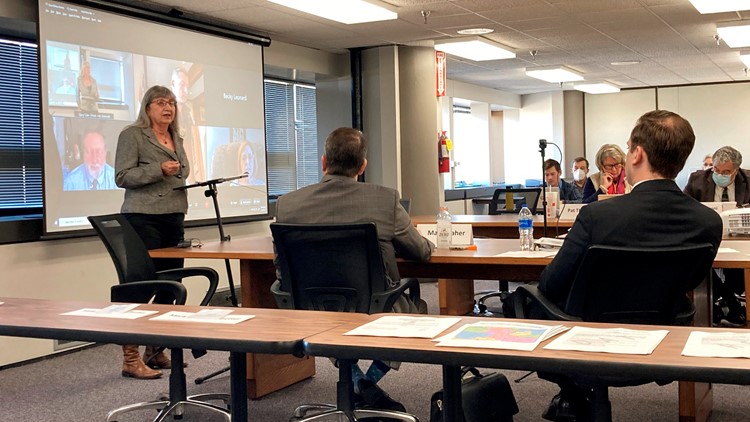JEFFERSON CITY, Mo. — The commissions in charge of redrawing Missouri's state House and Senate districts based on new census data are pushing up against a constitutional deadline to agree on tentative maps for next year's elections.
The separate commissions, each consisting of 10 Democrats and 10 Republicans, both met Monday without voting on proposed districts. Instead, they agreed to meet again Thursday, which is the deadline to submit a tentative redistricting plan the secretary of state's office.
If either commission fails to agree on a plan, then redistricting for that legislative chamber would be done by a panel of judges.
The House commission, at least publicly, had made more progress than the Senate commission when they met Monday. Republican and Democratic caucuses had publicly exchanged several versions of maps and generally agreed on how to divide many rural parts of the state.
That's partly because a constitutional amendment approved by voters last year diminished the potential to carve up sparsely populated counties. It places a priority on keeping counties and municipalities intact in districts, relegating partisan fairness and competitiveness to a lower priority than had originally been approved in a separate 2018 constitutional amendment.
The Republican and Democratic House redistricting plans differ on how to divide Boone County, home of Columbia, and Greene County, home of Springfield. In both cases, the urban cores of those cities include more Democratic voters while the rest of those counties include more Republican voters.
Whereas Republican commissioners have proposed a new House map for the entire state, Democratic commissioners on Monday still had not put forth details on how they would prefer to divide up St. Louis County and Jackson County, which includes much of Kansas City.
"I'm still hopeful that we can come to an agreement on a map on Thursday," said Jerry Hunter, the Republican chair of the House commission.
But some commissioners have floated an idea of submitting two tentative maps to the secretary of state. Although Hunter said he believes the constitution requires one tentative map, he said those proposing the dual map option believe it could satisfy the initial deadline. The commission then could proceed to a public hearing before facing a Jan. 23 deadline to approve a final map with the support of at least 14 of the 20 commissioners.
During the Senate commission meeting, which occurred immediately after the House one, a Democratic commissioner suggested that the Senate panel was unlikely to reach an agreement by Thursday and should also consider submitting two maps. But Marc Ellinger, the Republican chair of the Senate panel, said it was too soon to give up on an agreement.
"We're committed to negotiating," Ellinger said. "We've got three solid days that we should negotiate as hard and fast as we can."
Ellinger shared a proposed Senate map Monday with Democrats, who said they would need at least a day to come up with alternatives.
Missouri's redistricting commissions don't have a very successful track record.
Judges had to draw Missouri's House maps in 2011 and 2001 after commissioners failed to agree on a plan. Judges also had to draw Senate maps every decade since the 1980s, though their 2011 map got overturned by the state Supreme Court. After the court ruling, a second bipartisan commission was formed and completed the Senate redistricting in 2012.
The commissions are not responsible for redistricting Missouri's eight U.S. House seats. That job is to be done by state lawmakers when they convene their annual session in January.



